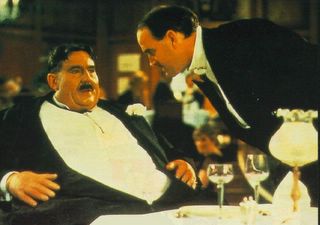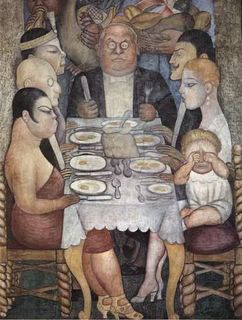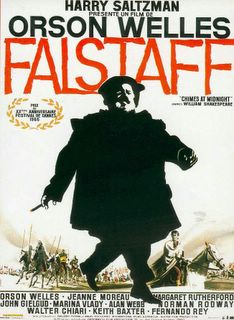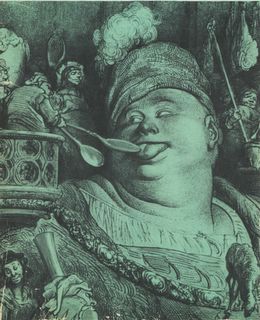
“I hope my stomach will get back its manners soon. Right now my bowels are bumbling around like a bull.”
The Old South Quartette, Oysters and Wine at 2 A.M.
The Reverend Horton Heat, Eat Steak.
The Beatles, Savoy Truffle.
Bob Wills, Roly Poly.
Little Feat, Fat Man in the Bathtub.
Jimmy Rogers, Sloppy Drunk.
The Original Sinners, Whiskey for Supper.
The concept of the deadly sins begins with the monks, and Francine Prose, in her fine recent work on gluttony, takes a guess at how that particular sin became canonized.
It is the evening meal, before compline. The brothers file into the refectory and wait in line to be served their allotment of bread, gruel, beans and wine. It’s been a hard day of prayer, transcription and prayer, and a great number of the brothers, despite their souls’ urgings otherwise, have their thoughts on their stomachs. Each monk receives his helping, but, as happens sometimes, there is a bit left over at the end. The last monk in line, who the brothers realize has the regular habit of being last in line, and who they also note is the heaviest of them all, happily and blithely takes a second portion. At table, the rest of the brothers grumble to themselves in silence: "Inconsiderate". "Swine". "Glutton."
Evagrius, the 4th Century monk who first compiled the sins, singled gluttony out as the prime offender, the worst of the lot.
"Gluttony is the mother of lust, the nourishment of evil thoughts, laziness in fasting, obstacle to asceticism, terror to moral purpose, the imagining of food, sketcher of seasonings, unrestrained colt, unbridled frenzy, receptacle of disease, envy of health, obstruction of the (bodily) passages, groaning of the bowels, the extreme of outrages, confederate of lust, pollution of the intellect, weakness of the body, difficult sleep, gloomy death."
Or, as George Harrison said less eloquently: "The sweat is going to fill your head/When it becomes too much, you're going to shout aloud."

All of the capital sins are consanguineous, but lust and gluttony especially are linked at the hip, both being failings of the flesh as well as (somewhat inconvenient to Church fathers) being neccessary to life--without food, the body fails; without sex, so goes the human race. As Prose puts it, "We are allowed to eat and have sex as long as we don't like it."
Throughout the Middle Ages, there was a general belief that gluttony was a gateway to further debauches of the flesh, which may seem a bit odd to us moderns, given that after a bloating, gut-busting meal, not many have a sudden craving for sex.

Still, here's St. Basil: "Through the sense of touch in tasting– which is always seducing toward gluttony by swallowing, the body, fattened up and titillated by the soft humors bubbling uncontrollably inside is carried in a frenzy towards the touch of sexual intercourse." And true, the early Christians had as their prime example the Romans, who gladly incorporated binging, purging and fornication into an evening's entertainment.
Today's menu
Oysters and Wine. Best served at 2 AM, when you're already drunk enough to truly make a gluttonous spectacle of yourself. This fantastic 1928 recording was performed by the Old South Quartette--it is a remake of a 19o9 performance by Polk Miller, who died in 1913. Available on American Pop, a great, sadly out-of-print compilation.
Steak. T-bones, New York strip, shell steak. Any kind--they're all available. Just shipped over from the shambles by the Reverend Horton Heat. "Eat Steak" came out of the Rev's attempt to write a psychotic beef industry advertisement. From 1991's Smoke 'Em if You Got 'Em. Other Rev merch here; tour dates here.
Mackintosh's Good News. A dessert of mixed chocolates. The coconut fudge, ginger slings, and pineapple hearts are especially recommended, but save room for the Savoy truffles. (Sung by the Beatles' house moralist, George, who had the soul of an unchaste monk--on 1968's White Album.)

"Savoy Truffle" was inspired by George watching Eric Clapton gorge himself on Mackintosh's chocolates, though the type of candies available seem a bit stomach-churning--akin to the Disgusting English Candy Drill that Tyrone Slothrop endures in Gravity's Rainbow:
"Serves me right," Slothrop, wondering just what he means by this, sipping herb tea to remove the taste of the mayonnaise candy---oops but that's a mistake, right, here's his mouth filling once again with horrible alkaloid desolation, all the way back to the soft palate where it digs in. Darlene, pure Nightingale compassion, is handing him a hard red candy, molded like a stylized raspberry... mm, which oddly enough even tastes like a raspberry, though it can't begin to take away that bitterness. Impatiently, he bites into it, and in the act knows, fucking idiot, he's been had once more, there comes pouring out onto his tongue the most godawful crystalline concentration of Jeez it must be pure nitric acid, "Oh mercy that's really sour," hardly able to get the words out he's so puckered.."
By the bellyful
Much loathing of gluttony, then and now, often leads into a full-bore assault on the body itself, a general hatred for the unclean process of eating, digesting and voiding. As the repellent Saint John Chrysostom, author of Eight Homilies Against the Jews, put it, "the increase in luxury [of eating] is nothing but the increase in excrement."
Or here is the Pardoner, in Chaucer's tale: "O womb, O belly, stinking is thy cod [bag]/Full fill'd of dung and of corruptioun;/At either end of thee foul is the soun."

This aspect of gluttony, a loathing for the overfed body, has travelled well over the centuries--watch any episode of Dr. Phil, read any issue of US Weekly, in which starlets walk a razor-thin line between paunchiness and anorexia; it is a natural result in a country in which the rich are now professionally gaunt and the poor often greatly overweight.

"(from L to R) Fat! Still Fat! Perfect! My God, she's thin!"
So you could say that gluttony has been vanquished as a sin, in a way other of the deadlies have not--not that gluttony is going away any time soon, but that its appeal has been drummed out of our culture. Some still pride themselves on their greediness, the lustful are often fairly outspoken about it. But the gluttons are now classified as pathetic failures, or passive victims, trapped in shaming relationships with food, while eating has become a metaphor for everything but actually enjoying consuming food.

Gone (forever?) are the great, voracious gluttons of old--Falstaff ("that trunk of humours, that bolting-hutch of beastliness, that swollen parcel of dropsies, that huge bombard of sack"); Orson Welles (whose evening repast would consist of two steaks and a pint of scotch); Henry VIII; Robert Earl Hughes, who had to be buried in a piano case-sized coffin; Gargantua; Diamond Jim Brady, the American industrialist who would sit six inches away from the table and only stop eating when his gut reached the table edge.
Or William Howard Taft, the most obese president in U.S history (ironically succeeding Teddy Roosevelt, the first health nut in office), and the subject of much jest: "While he was in the Philippines, disturbing reports about his health caused Secretary of War Root to send a cabled inquiry. Taft cabled back that he was perfectly all right -- he had just finished a twenty-five-mile horseback ride and was feeling fine. Root read that, smiled, and sent off another cable of solicitude: 'How is horse?'"
Popular music has generally taken the side of the gluttons--not many songs come to mind that praise the healthy and lament the fat. Take "Roly Poly", a nice slice of 1945 western swing from Bob Wills and the Texas Playboys. While the mini-Gargantua who is the song's subject seems a little terrifying, eating 20 times a day and even scarfing down hay between meals, the singer seems proud of him, even awed by him. (On The Essential Bob Wills.)

Or the Fat Man in Little Feat's 1973 song, symbol of our protagonist Billy's gluttony for everything in sight--women, drugs, good clean fun. On the marvelous Dixie Chicken.

21st Century Demeter
Whiskey to go
I've run out of time to talk about drunkenness, the other half of gluttony, equally hated by the moralists. As the Pardoner says, "When man so drinketh of the white and red/That of his throat he maketh his privy". And a Friday night spent in any college town, or the Upper East Side of Manhattan for that matter, makes the Pardoner's argument seem a bit sympathetic.
Still, here are two celebrations of getting bombed. "Sloppy Drunk" is a 1954 blues from Jimmy Rogers. Jimmy's not mourning a failed relationship--he just wants to get drunk until he falls down on the barroom floor. On Complete Chess Recordings.
And "Whiskey for Supper" is by the Original Sinners, an all-star team of former punks, led by Exene Cervenka. From their self-titled 2002 album.
As Trimalchio, the ex-slave feastmaster in Petronius's Satyricon, the great epic of Roman debauchery, says, "Just think friends, wine lasts longer than us poor suffering humans. So soak it up, it's the stuff of life." Salut!
No comments:
Post a Comment